Spiders Engage, Spiders Reflect

BONNER CENTER FOR CIVIC ENGAGEMENT | ANNUAL REPORT 2022-23
Mission
The Bonner Center for Civic Engagement (CCE) prepares students for lives of purpose and connects student, faculty, staff, and community stakeholders in social change efforts that value the knowledge and potential in our communities.

Vision
The University of Richmond will be a vital partner to a thriving Richmond region, catalyzing lifelong learning and civic engagement.
Students reflect together during Junior Journey, a capstone experience of the Bonner Scholars Program.
2
WHY REFLECT?
Years ago, I showed a CCE video at New Student Orientation. In it, UR students finished the sentence “I engage because….” With inspiring music in the background, a series of students reflected on their reasons for engaging actively in the Richmond community. And then, the camera cut to a student reading the newspaper. He said, simply: “I engage by reading the newspaper.” There was a ripple of surprised laughter in the room.
I think about this reaction often and what it reveals of our assumptions about what “counts” as active participation in our communities. Reading the newspaper is perhaps not in itself a paramount act of civic engagement. But putting our experiences in a critical context, making meaning of what we’ve seen and heard, and knitting those experiences together with multiple perspectives is at the very heart of civic engagement.
I am keenly aware of this as I have just returned from five months in Helsinki, Finland, where I was studying innovative practices for community-building and civic action as a Fulbright grant recipient. The deep learning, the lessons that came home with me, happened in public libraries, coffee shops, and on trams across the city, as I scribbled notes on conversations and experiences, connected the dots, synthesized. Meaning came in the reflection.
In this year’s annual report, Bonner Center for Civic Engagement staff highlight the ways we make space for reflection through our diverse programs. We also invited faculty, students, and community partners to share their reflections about their community engagement experiences. Their stories are small windows into the many ways that Spiders are engaging, learning, and making meaning of our world, together.
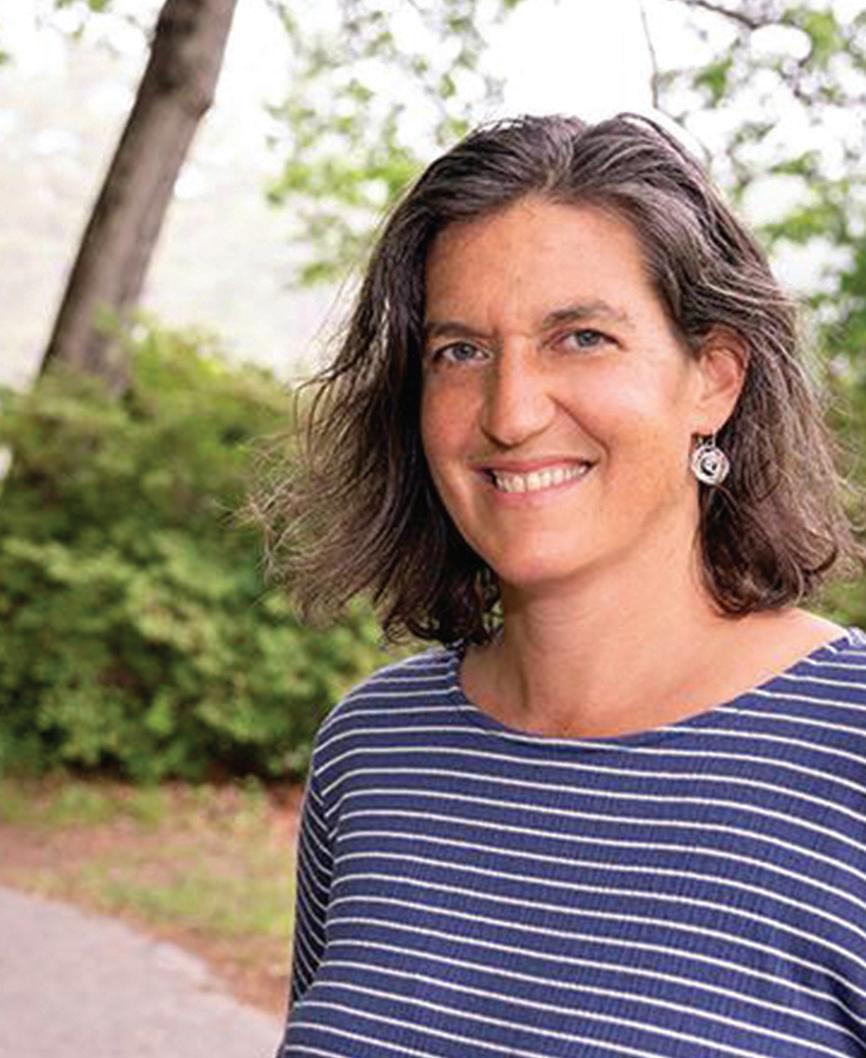 Sylvia Gale Executive Director, Bonner Center for Civic Engagement
Sylvia Gale Executive Director, Bonner Center for Civic Engagement
3
Faculty Reflecting 4 Students Reflecting 9 Community Partners Reflecting 14 Engage for Change 17 By The Numbers 18 Community Relationships 19
FACULTY REFLECTING
 Terry Dolson Senior Associate Director, Community-Engaged Learning Bonner Center for Civic Engagement
Terry Dolson Senior Associate Director, Community-Engaged Learning Bonner Center for Civic Engagement
Reflection is the critical element of community-engaged courses at UR. Faculty who teach community-based learning courses design reflection assignments that weave academic content with community experiences, helping students discover their own assumptions and deepen their understanding. In the CCE, we believe that good reflection assignments come from faculty who have experienced reflection in a community context themselves, and we provide opportunities for faculty to practice reflection through our faculty learning communities, excursions, and events.

4 4 Faculty Reflecting
“
Reflection is the critical element of communityengaged courses at UR.”
Deniz Besik
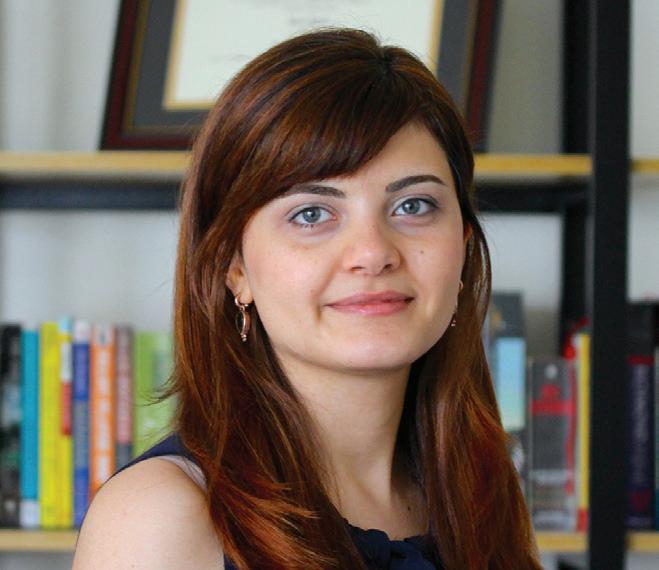 Assistant Professor of Analytics & Operations
Robins School of Business Faculty Fellow, (Re)Engage
Assistant Professor of Analytics & Operations
Robins School of Business Faculty Fellow, (Re)Engage

Together
This fall, my Operations Management students volunteered at the FeedMore warehousing department, where we assisted in packing food for individuals facing food insecurity. The experience was significant because the students not only applied the concepts learned in class, such as identifying bottlenecks and implementing quality control measures, but also made a meaningful societal impact. This is particularly relevant in the field of operations management, as the tools we teach can be implemented in various organizations, regardless of their profit orientation. After the volunteering activity, I provided the students with reflection questions. Their answers emphasized the immense value of the experience, not only in terms of applying what they learned in class, but also the connections they formed and the sense of making a positive contribution. In fact, I received emails from a few students expressing their desire to continue volunteering in the next semester, even if they were not enrolled in the class.
5 Faculty Reflecting
122 COURSE SUPPORT GRANTS were awarded to 71 unique faculty in 28 academic departments in 2022-23
CCE visiting scholar and historian Lauranett Lee leads Patricia M. Stohr-Hunt and Lynn Bland’s Instruction and Assessment in Elementary Social Studies students on a walking tour of Church Hill.
Christopher Oliver
Bev Perdue Jennings Associate Curator of American Art, Virginia Museum of Fine Arts, Visiting Professor of Art History, School of Arts & Sciences, and Course Support Grant Recipient

With the financial and logistical support of the Bonner Center for Civic Engagement, our Museum Studies class visited five museums around Richmond — making multiple visits to the Virginia Museum of Fine Arts and exploring many different facets of why and how museums remain vital, vibrant parts of our community. We experienced firsthand the impacts of dozens of museum professionals, learning directly from them about their careers, roles, and aspirations as we imagined the future of museums. What I believe makes such a course so valuable is seeing the tangible results of the aspects of Museum Studies, including strategic planning and the institution’s mission, that may in the classroom seem abstract.
Danielle Stokes
Assistant Professor of Law, School of Law Course Support Grant Recipient

In Fall 2023, I taught an environmental justice seminar that provided historical context for the environmental justice movement and exposure to current issues. The CCE supported a field trip to the Science Museum of Virginia which allowed the class to participate in an air quality walk and experience the exhibition Skin: Living Armor, Evolving Identity. This trip concretized our discussions on climate change, distributive justice, and social equity. More practically, it sparked ideas for students who were finalizing their research topic and helped to frame my perspective on community science. This was a particularly impactful experience for students as one noted, “I love getting to walk around seeing people involved in the same thing (in the capacity of an activist, expert, etc.) we are studying through a legal lens.”

6
Faculty Reflecting
“We experienced first hand the impacts of dozens of museum professionals, learning directly from them about their careers, roles, and aspirations as we imagined the future of museums.”
Christopher Oliver’s Museum Studies students explore exhibitions at The Valentine, including an installation of the Jefferson Davis statue removed from Monument Avenue by protesters in 2020, with curator Christina Vida.
Assistant Professor of Leadership Studies

Jepson School of Leadership Studies
Faculty Fellow, East End Cemetery
Collaboratory

In 2022-23, I co-coordinated two workdays for students at Woodland Cemetery, a historically AfricanAmerican burial site roughly 20 minutes away from campus. The first workday coincided with my class, Killers and Cults: Leadership Gone Awry, and was designed to get students handson experience understanding the inequalities present in commemoration after death. The second workday coincided with my Leadership and the Humanities class and allowed students to assess how leadership is on display at places like cemeteries. In both cases, students walked away with a deeper understanding of cemeteries as historical sites, the value of preservation, and the structural nature of inequality in the Richmond area. Both groups of students wrote thoughtful and specific reflections on their experiences, took photographs of the work they accomplished, and continued to comment on their experiences via open-ended reflections at the end of each semester.

7 Faculty Reflecting
Lauren Henley
Lauren Henley’s community-based learning students volunteer at historically African American Woodland Cemetery.
Patricia M. Stohr-Hunt Assistant Professor of Elementary Education, and Chair, Department of Education School of Arts & Sciences Faculty Fellow, (Re)Engage Together

This year, my course entitled Instruction and Assessment in Elementary Social Studies, co-taught in the spring with Chesterfield County Public Schools instructional specialist and School of Professional & Continuing Studies (SPCS) adjunct professor Dr. Lynne Bland, was redesigned to include a significant community-based learning component. A group of students that included traditional undergraduates (Arts & Sciences students) and candidates in the Master of Teaching program (SPCS students) explored the teaching of history and social science through the lens of place and local history. We held class sessions in the Book Arts Studio and The Valentine. We had guest speakers from the Virginia Museum of History & Culture and the New American History Project. After reading Richmond’s Unhealed History by Ben Campbell, Dr. Lauranett Lee led the class on a walking tour of the Church Hill neighborhood to explore sites related to African American history in Richmond. At the end of the semester, students wrote a final essay in which they reflected on “what you have learned in class and community-based sessions and how these ideas have shaped your evolving understanding of yourself as a learner and future teacher of social studies.” The impact the community-based experiences had on students was profound. The walking tour was described by many students as transformative. This excerpt from a student’s final essay was echoed across many papers:
“Our class’s learning experiences outside of the traditional classroom, including making our own books at the Book Arts Studio, The Valentine museum visit, the virtual lecture by Dr. Ed Ayers, Maggie Creech’s visit from the Virginia Museum of History & Culture, and especially the walking tour of Richmond were the most memorable I have had as a student anywhere.”
 Olivier Delers
Olivier Delers

Professor of French, Languages, Literatures, & Culture, School of Arts & Sciences, Faculty Fellow, Community Engaged Scholarship: Writing for Academic Audiences
This year, I was lucky to join a CCE faculty learning community. In our meetings, I was able to reflect on the amazing community-engaged work happening with students and on the thoughtfulness with which my colleagues approach community-based learning and scholarship. It was really useful to think in critical ways about the different community-based learning projects I’ve created and to receive feedback from others for developing new ideas and practices. These reflective conversations helped me to submit and successfully present an academic paper at the Gulf South Conference on Service Learning and Civic Engagement through Higher Education on the community engagement which is central to my Sophomore Scholars in Residence community Reading to Live.
8 Faculty Reflecting
“I don’t know that I’ll ever be able to go back to teaching this course without the vital connections and insights provided by these communitybased learned experiences.”
Students work together at the Book Arts Studio.
STUDENTS REFLECTING
Blake Stack
Senior Associate Director, Student Engagement, and Director, Bonner Scholars Program Bonner Center for Civic Engagement


To support the growth of student’s civic identity, understanding of complex social issues, and capacity to contribute to positive social change, the CCE invites students into opportunities for reflection at every step in their civic engagement journey, from peer advising appointments, new student orientations, a volunteer basics class focused on civic engagement (offered as part of the WELL 100 course), trainings designed to help students think critically and intentionally about community-engaged initiatives, and co-curricular dialogues and panels. And sometimes, reflection is as simple as asking a student who spends time working in community, “what are you noticing these days? What are you finding yourself still thinking about when you come back to campus?”
The Bonner Scholars Program
The Bonner Scholars Program provides financial support to students who make a four-year commitment to community engagement. Critical and intentional reflection is foundational to a Bonner Scholar’s experience, facilitated by workshops with local and national leaders; an academic integration requirement; written reflections that promote critical thinking on the CCE’s learning outcomes; and capstone experiences that provide students an opportunity to demonstrate the impact of community engagement on their learning, growth, and development.

Students Reflecting 9
Top and lower right: Students engage at Arts Together in Raleigh, NC, during Sophomore Exchange, a capstone experience of the Bonner Scholars Program.
My goal in life is to build trust between marginalized communities and medical institutions. I believe that my Bonner Scholars experience and life experience propelled me to see how my aspirations of becoming a physician don’t exist within a vacuum. Building bridges that come from pain and discrimination will not be easy, but it can still lead to significant changes in historically marginalized communities and even among my own family.
100 BONNER SCHOLARS dedicated up to 10 hours per week to community engagement



10
Kavon Thompson, ’23
Bonner Scholar and CCE Senior Program Associate
Students Reflecting
Students gather with Kavon Thompson after his senior Presentation of Learning.
Students traveled to Raleigh, NC, during Sophomore Exchange, a capstone experience of the Bonner Scholars Program that connects different universities.
Excerpt from March Presentation of Learning
Paean Luby, ’25, and Na’Dyah Wynn, ’24 Leaders of UR’s Girls Who Code and Recipients of a CCE Fund Grant



This spring, Girls Who Code organized a hackathon called Code Green at CodeRVA, an innovative, regional, public high school in central Virginia focused on preparing students for college and careers in computer science and coding. The event empowered us to step out of our comfort zone in helping plan and execute a computer science event to provide women high school students the opportunity to explore real-world applications of computer science. Working in teams assisted by our facilitators, students were given the creative freedom to select their own problem or to create a software-based product that addresses electronic waste. In addition to offering an after-school event for CodeRVA students, we stimulated collaboration between female students from different age groups. We saw girls giving high fives, hugging, and congratulating each other on their projects following the event.

11
Students Reflecting
Paean Luby works with CodeRVA high school students at the Girls Who Code hackathon event in February.
Julia Brittain,
’23
Civic Fellow, Summer 2022 (Faculty Advisor: Rick Mayes) and CCE Healthcare+ Program Associate

One of my favorite community engagement experiences was taking a group of students to Goochland Cares for an evening of volunteering at their clinic. Goochland Cares is a one-stop shop for all healthcare related needs, not only providing patients with health and dental services, but also healthy food, social services, affordable clothes, and transportation to and from their clinic. It really serves as a great model for how we can make sure all of people’s needs are taken care of. With support from the CCE, I brought fourteen UR students to Goochland Cares where we were able to help sort their Food Pantry and Clothing Closet, shred old medical records, and clean their vans. For many of the students, it was one of their first volunteer experiences at UR, and it was awesome to see their excitement as they helped with the tasks at hand. It really highlighted for me that there is a lot of energy around volunteering at UR, and the CCE plays a huge role in helping connect students with opportunities that align with their interests.

Esteban Figueroa, ’23
Community-Based Learning Student in Professor Joyce van der Laan Smith’s Volunteer Income Tax Assistance (VITA) II and Quality Reviewer with the United Way of Greater Richmond & Petersburg’s Tax Assistance Program
As quality reviewers, we are able to provide some financial literacy, help people understand the tax filing process, and demystify it because we have the ability to walk people through the tax return. Volunteering opened my eyes to just how much need there is in the community for financial services that can be done through students like me. Using just a couple hours of our time a week, there is a big impact this program makes. Clients leave with some money that they can use for daily necessities, a better understanding of the tax system, and some knowledge that they can apply for future returns. One of the best parts about the VITA program is getting some community experience and being able to translate what we learn in class to real-life situations. It has helped me better understand my field of work and given me skills to bring to my career.
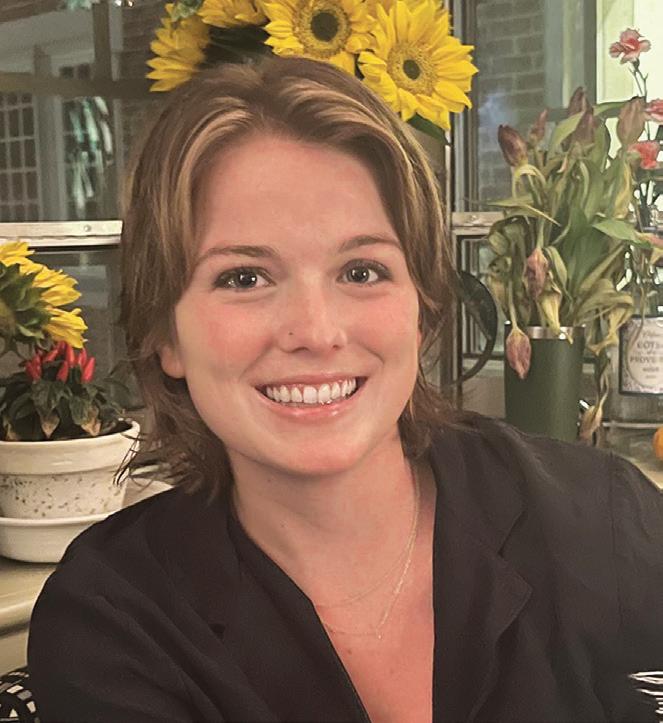
12 Students Reflecting
Students volunteer at Goochland Cares in February.
“The CCE plays a huge role in helping connect students with opportunities that align with their interests.”
Civic Fellow, Summer 2022 (Faculty Advisors: Mary Finley-Brook and

As a Civic Fellow, I worked with C5, a grassroots organization based out of Charles City County. C5’s mission is to empower citizens to act and make decisions with as much information as possible and to have their voices heard. My job was to create a series of maps and a presentation to inform C5 supporters about a mega-landfill that is located in Charles City. My past experience making maps has been pretty straightforward, but making maps with C5 was a much more collaborative process
than I ever could have imagined. I knew from past academic readings that community work was about collaboration, but this was the first time I’d seen this play out in real life and I’m really grateful to have had the opportunity to work with such an amazing group of people. The experience really strengthened the GIS work I continued to do during my senior year through my courses and work with Unpacking the Census.

Sandy Franco, ’25 Pathways to a College Experience (PACE) Program Assistant
I work with PACE to bring elementary and middle school students to the University of Richmond campus. We provide campus tours and partner with many departments to share a holistic college experience. I enjoy getting to know these students and answering their questions about college. I had not realized how much we, as college students, embody what these elementary and middle school students want to become when they grow up. PACE really motivates students to think about college and look to the future.

13
Beth Zizzamia)
Students Reflecting
Sarah Murtaugh, ’23
Kyle Redican, Spatial Analysis Lab director, and Sarah Murtaugh present Unpacking the Census research at the Virginia Association for Mapping and Land Information Systems (VAMLIS) Conference in April.
Sandy Franco leads a PACE campus tour for Achievable Dream Academy students from Henrico County Public Schools in June.
“ I had not realized how much we, as college students, embody what these elementary and middle school students want to become when they grow up.”
COMMUNITY PARTNERS REFLECTING
Kim Dean-Anderson Senior Associate Director, Community Relationships
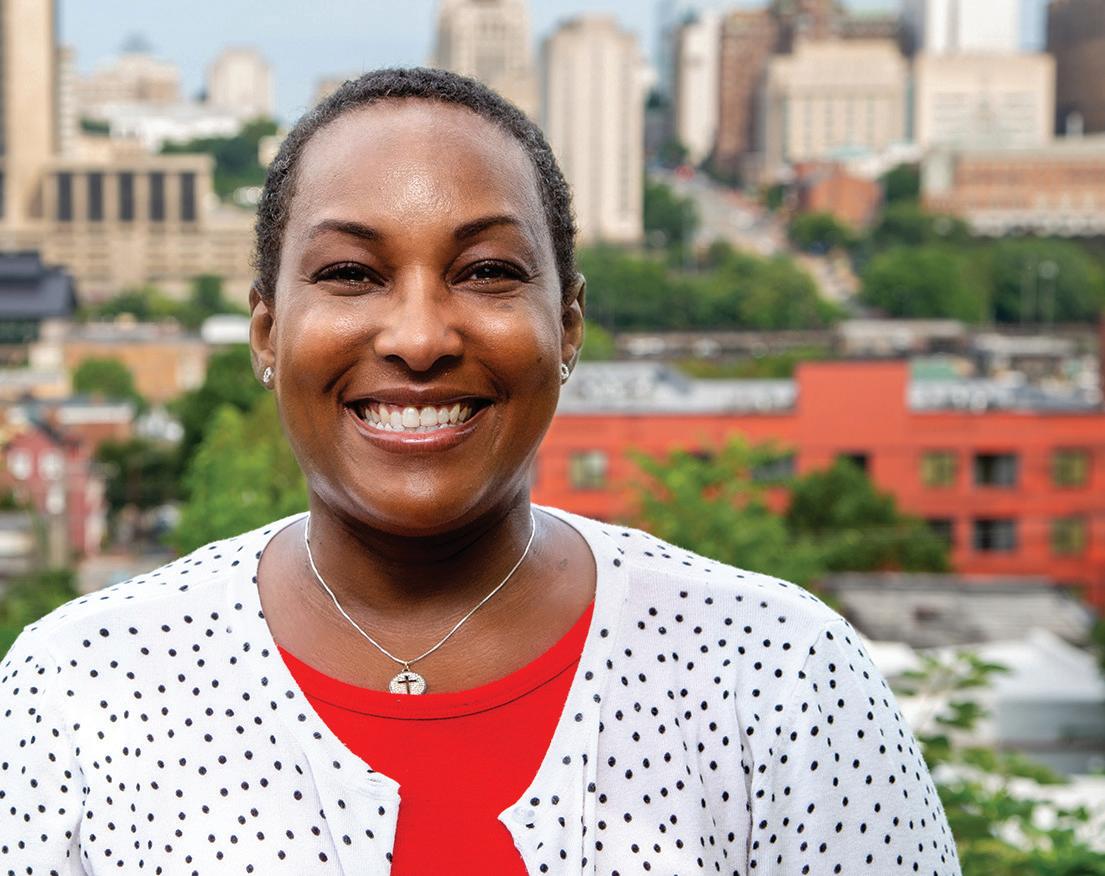

Bonner Center for Civic Engagement
In the CCE, we understand the power of long-lasting, reciprocal community relationships rooted in trust and characterized by an exchange of multiple kinds of knowledge. We connect regularly with over 80 organizations and listen carefully to understand communityidentified priorities in the region. Community partners are experts, mentors, co-educators, and collaborators, and University of Richmond faculty, staff, and students are reflecting with and learning from our community partners every day. These learning relationships and the activities that come from them make me proud to be a Spider and a Richmonder.
14
Community Partners Reflecting
87
COMMUNITY RELATIONSHIPS sustained by the CCE in 2022-23
Kelsea Jeter
Community Partner and Volunteer Program Manager, Health Brigade


At Health Brigade, volunteers work in partnership with staff to provide essential services to patients and clients and support our mission to provide exceptional health services to those least served in a caring and non-judgmental environment. In my role as volunteer program manager, I have the pleasure of working with folks who are inspired to give back to their community and grow in new ways every day. I’m constantly learning from our interns and volunteers just as much as they are learning from being with us.

15 Community Partners Reflecting
Gail Cavallaro, Community Foundation for a greater Richmond director of civic engagement, Carolina Lugo, Sacred Heart Center director of programs, and Kerry Mills, 1708 Gallery InLight lantern project coordinator, lead a panel discussion — Thinking Outside the Zoom Box: Pandemic Lessons on Engagement — during the Community Partners Gathering hosted on campus in May.
First-year students volunteer at Health Brigade during the Roadmap to Success pre-orientation program in August.
The Community Partner-in-Residence Fellowship provides funding, space, time, and thought partnerships for regional changemakers to explore creative solutions and ideas during an on-campus residency.
Stephanie Willett
2022-23 Community Partner-inResidence (CPiR) and Community Engagement Lead for the Agee-MillerMayo-Dungy (AMMD) Pine Grove Project
The CPiR Fellowship was a wonderful and life changing professional development experience for me. As a result, I am far more useful to my nonprofit, AMMD Pine Grove Project. The AMMD Pine Grove Project’s goals are to protect and preserve the legacy of the Pine Grove School, a Rosenwald school, and celebrate the African American heritage of Cumberland. This community is newly under threat from a proposed landfill that will disrupt the evidence of this heritage and threaten the health of the community. I was able to delve into community engagement best practices and expand my professional network. Additionally, I was able to document the social context for the community where we work, with the hope that this will help guide our strategic planning for long-term impact.
The East End Cemetery Collaboratory brings together faculty, staff, students, organizations, and community partners in Richmond to document and support African American history and culture via the region’s cemeteries.


Loretta Tillman
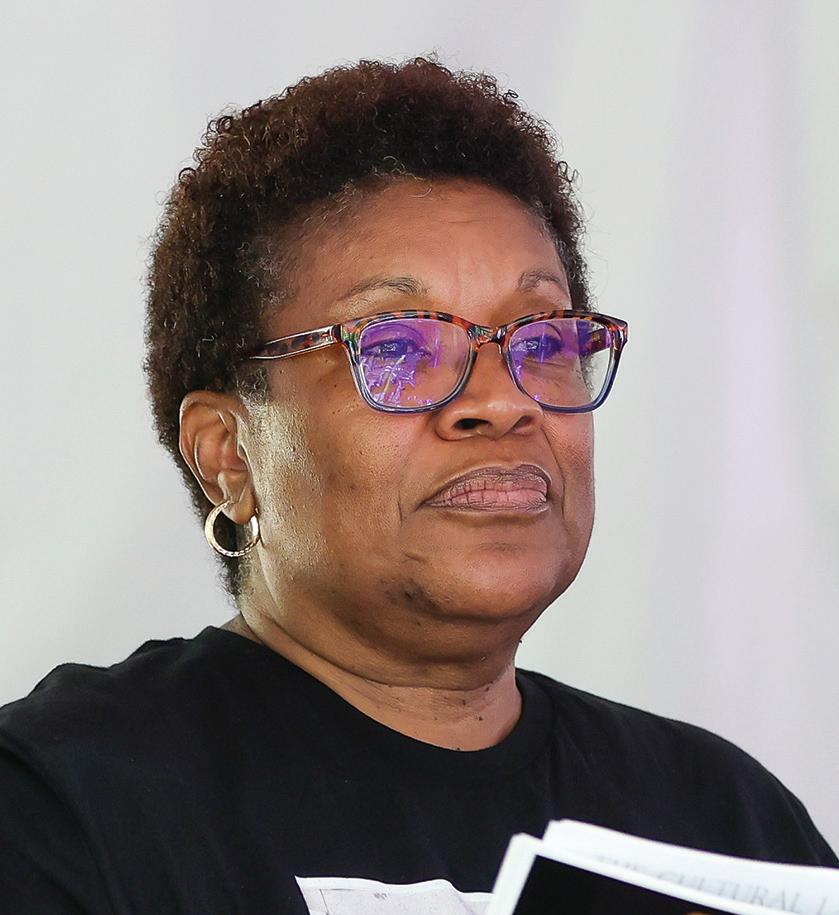
Community Partner and Member of the East End Cemetery Collaboratory
The East End Cemetery Collaboratory has made a significant and positive difference in the short and long term health and security of African-American cemeteries in the Richmond region. I truly believe that engaging the next generations is the only way to do that properly, and the East End Cemetery Collaboratory is not only fulfilling that goal but also connecting those generations with prior ones to protect these sacred spaces. I’m grateful to participate as a community member and to be a part of keeping things going on a great trajectory.
16 Community Partners Reflecting
AMMD Pine Grove Project hosted a historical marker unveiling ceremony in April.
“ I was able to delve into community engagement best practices and expand my professional network.”
ENGAGE FOR CHANGE AWARDS CELEBRATION
At the start of every academic year, the Bonner Center for Civic Engagement celebrates and acknowledges students, faculty, staff, and community leaders working together to make an impact in our communities.

Holly Blake
Recipient of the Contribution to the Institution Award
Community-engaged learning cultivates equitable relationships, challenges assumptions, reveals systemic inequalities, and inspires new thinking. When students form relationships and follow the lead and direction of people with lived experience, they have the kind of “Ah ha” moments that just don’t happen in the classroom. To me, community engaged learning is one of the best ways for students to develop and apply an equity lens to how they think, act, and exist in the world.
The 2022 Engage for Change honorees were Holly Blake, director, will program, and associate dean for outreach education and development; Concerned Citizens of Charles City County (C5); Ryan Doherty, ’25; McKenna Dunbar, ’23; Ana Edwards, public historian and education programs manager at the American Civil War Museum; Mary FinleyBrook, associate professor of geography and the environment; Karen Kochel, professor of psychology; Maia Linask, associate professor of economics; Chuck Mike, associate professor of theatre; and Megan Salters, ’23. Not pictured: Annie Wang, ’22, Allison Moyer, director of landscape services, and Sarah Murtaugh, ’23
Ana Edwards Recipient of the Community Educator Award

The very, base, pragmatic truth is that we need as many hearts and brains on the creative and consistent task of moving this world community toward equity, compassion, and collective thriving as humanly possible.

17
Engage for Change
BY THE NUMBERS
87
COMMUNITY RELATIONSHIPS sustained by the CCE in 2022-23
100 BONNER SCHOLARS dedicated up to 10 hours per week to community engagement
55
4 FACULTY LEARNING COMMUNITIES supported by the CCE in 2022-23
EDUCATIONAL EVENTS hosted by the CCE in 2022-23
Class of 2023 Bonner Scholars served with
78 UNIQUE NONPROFIT organizations in Richmond and beyond during their four years
33 STUDENT VOLUNTEERS prepared 445 tax returns for $427,563 total refunds and $107,514 in Earned Income Tax Credits in 2022-23
1,972 UNDERGRADUATE STUDENTS took at least one community-based learning course
16 CIVIC FELLOWS INTERNED in summer 2022 with guidance from site supervisors and faculty advisors
122 COURSE SUPPORT GRANTS were awarded to 71 unique faculty in 28 academic departments in 2022-23
84% OF THE CLASS OF 2022 took at least one community-based learning course while at UR
18
By The Numbers
COMMUNITY RELATIONSHIPS
1708 Gallery
American Red Cross
ART 180
Art for the Journey
Befriend
Birth in Color RVA
Bridging the Gap in Virginia
Boaz & Ruth
CancerLINC
CARITAS
Rise Richmond
CodeRVA
Collegiate Recovery Program
Commonwealth Catholic Charities Communities in Schools
Conner’s Heroes
Cross Over Healthcare Ministry
Enterprise Community Development
Evelyn D. Reinhart Guest House
Feed More
Girls for a Change
Goochland Cares
Greater Richmond Stop Child Abuse Now
Happily Natural Day Health Brigade
Henrico Education Foundation
Hermitage Richmond
Higher Achievement
Housing Opportunities Made Equal of Virginia
International Rescue Committee
IT4Causes
James River Association
James River Parks
Latinos en Virginia
Legal Aid Justice Center
Library of Virginia
MENTOR Virginia
Metropolitan Business League
New Virginia Majority
Nurture RVA
Office of Community Wealth Building
Office of the Secretary of the Commonwealth
Peter Paul
Planned Parenthood
PlanRVA
Real Life Program
Richmond City Human Services
Richmond City Office of Sustainability
Richmond Metropolitan Habitat for Humanity
Read to Them
ReEstablish Richmond
Richmond City Council
Richmond Public Defender’s Office
Richmond Public Schools
Richmond Symphony
Richmond Performing Arts Alliance
RVA Works
Sacred Heart Center
Science Museum of Virginia
Shalom Farms
Sierra Club
SOAR 365
Special Olympics of Virginia
State Council of Higher Education in Virginia
The Salvation Army Boys & Girls Club
The Valentine Virginia Civic Engagement Table
The Doorways
The Virginia Home
Tuckahoe YMCA
United Way of Greater Richmond & Petersburg
Virginia 21
Virginia Anti-Violence Project
Virginia Center for Inclusive Communities
Virginia Community Capital
Virginia Environmental Justice Collaborative
Virginia Interfaith Center for Public Policy
Virginia Interfaith Power & Light
Virginia Museum of Fine Arts
Virginia Museum of History & Culture
Virginia Neonatal Perinatal Collaborative
Viridiant
Voices for Virginia’s Children
World Pediatric Project
Youth Life Foundation of Richmond
YWCA of Greater Richmond
19
Community Relationships
20 BONNER CENTER FOR CIVIC ENGAGEMENT Tyler Haynes Commons 270 Richmond Way University of Richmond, VA 23173 engage.richmond.edu



 Sylvia Gale Executive Director, Bonner Center for Civic Engagement
Sylvia Gale Executive Director, Bonner Center for Civic Engagement
 Terry Dolson Senior Associate Director, Community-Engaged Learning Bonner Center for Civic Engagement
Terry Dolson Senior Associate Director, Community-Engaged Learning Bonner Center for Civic Engagement

 Assistant Professor of Analytics & Operations
Robins School of Business Faculty Fellow, (Re)Engage
Assistant Professor of Analytics & Operations
Robins School of Business Faculty Fellow, (Re)Engage








 Olivier Delers
Olivier Delers



























